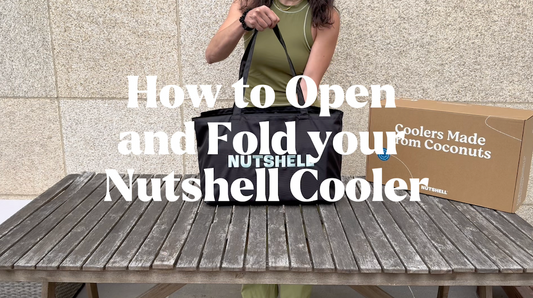From Trash to Treasure
The Benefits of Upcycling Coconut Husks Into Insulation For Nutshell Coolers
By Ashley H.
Coconut trees are an important part of many tropical landscapes and are known for their delicious meat, refreshing water, and versatile oil. But, did you know that the coconut husk, which is often discarded as waste after the meat is harvested, can be upcycled into a variety of useful and eco-friendly products?
Upcycling coconut husks not only reduces waste but also provides a range of benefits, from supporting farmers’ livelihoods to offering alternatives to plastic and other non-biodegradable materials.
Coconut husks have some pretty impressive benefits, check it out!
- Eco-Friendly: Upcycling coconut husks for cooler insulation replaces plastic foam insulation and the associated waste! Plus using coconut husks as insulation gives agricultural waste a second life, avoiding the substantial amounts of CO2 emissions from husk incineration.
- Excellent Insulators: Coconut husk fibers have great insulation properties, making them a perfect material for coolers. Small air pockets in the fibers prevent heat from entering and escaping the cooler, maintaining the temperature of the object that was placed inside (Yes, this means our coolers can keep things warm too!).
- Super Durable: Husk fibers are designed to protect the coconut when it falls from the palm tree, so they’re extra tough and durable, making them a long-lasting material for cooler insulation. They can withstand the wear and tear associated with regular use and are resistant to moisture, mold, and pests.
- Price-competitive: Since coconut husks are usually discarded as waste, it's an affordable raw, natural material that is widely available in tropical regions, allowing it to compete with synthetic alternatives and disrupt the plastic insulation market.
- Versatile: Coconut husk fibers can be processed into different shapes. They can be cut and formed to fit any cooler, allowing us to vary the density and thickness to match the user's need (For example, a small picnic cooler or cooler bag for a quick trip to the grocery store vs a larger camping cooler one for overnight camping trips).
- Supports Farmers: We support sustainable agriculture through buying leftover husks from smallholder farmers in some of the poorest regions of the Philippines. This provides them with extra income to spend on food, school fees, and community investment.
Overall, upcycling coconut husks into cooler insulation is a sustainable, price-competitive, and durable solution that contributes to a shift towards a circular economy. For more on our coconut coolers, check out our shop page HERE.



